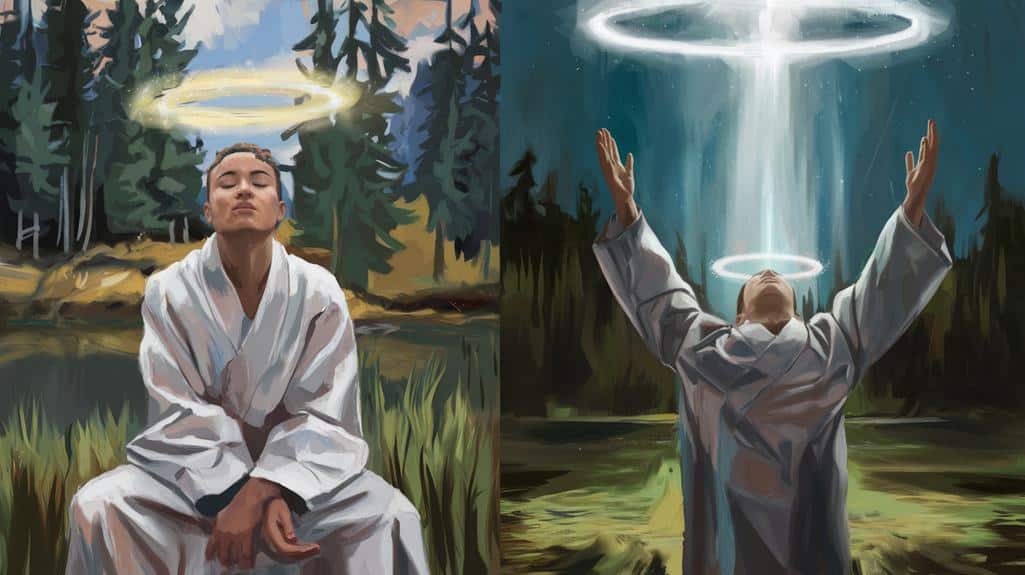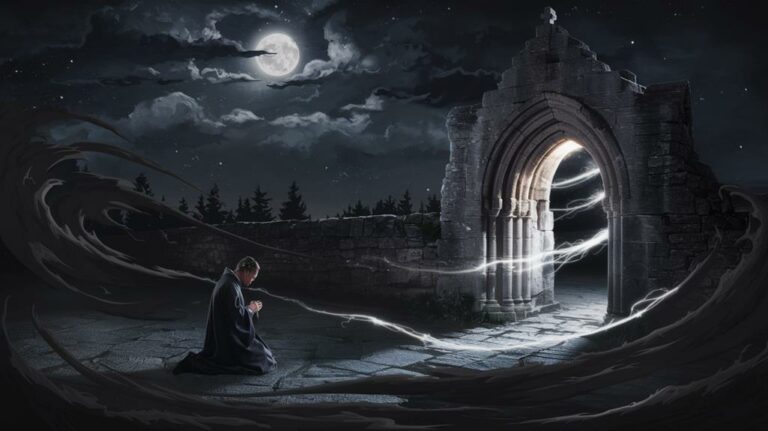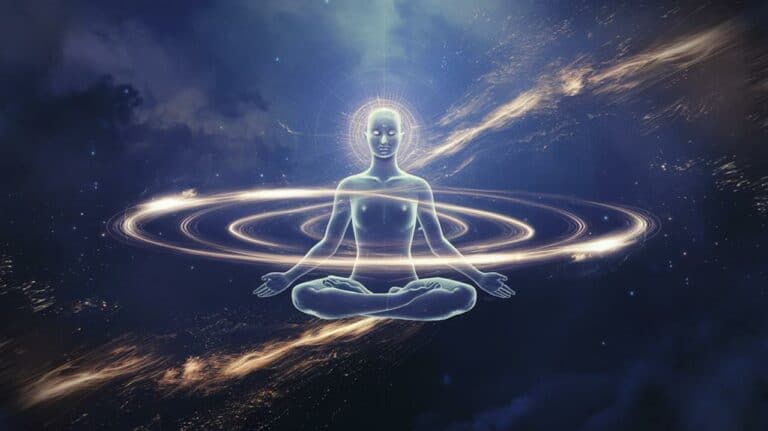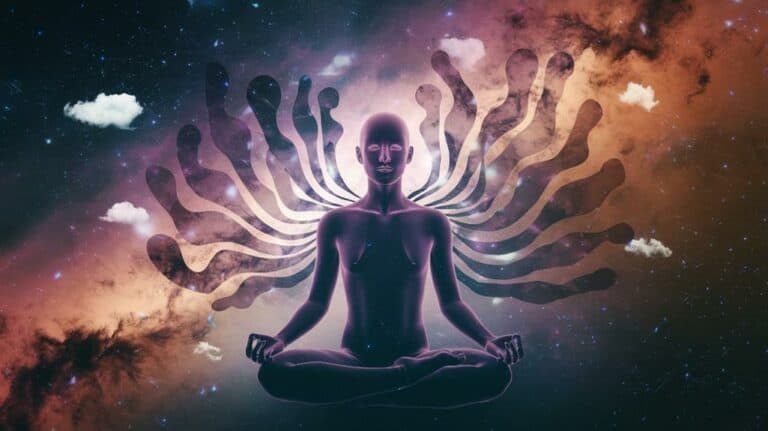Difference Between Spirituality and Mysticism
When you explore the domains of spirituality and mysticism, you might find that while they are intertwined, they have distinct focuses and experiences. Spirituality is a broad and personal journey, involving practices like meditation, prayer, and rituals to connect with the divine and foster personal growth. On the other hand, mysticism is about direct, transformative encounters with the divine, characterized by profound and often esoteric experiences that blur the boundaries between self and the universe. As you differentiate between these two concepts, you’ll discover how spirituality sets the stage for ongoing exploration and understanding, while mysticism seeks immediate, awe-inspiring unity. But what exactly sets these experiences apart, and how do they intersect with religion and philosophy?
Defining Spirituality

In your pursuit of spirituality, you may find yourself engaging in various practices such as prayer, meditation, or contemplation. These activities aim to deepen your spiritual connection and foster a sense of oneness with something greater than yourself.
Spirituality is about experiencing and connecting with the divine or the universe in a way that transcends mere intellectual understanding. It’s a quest for meaning and truth that resonates deeply within your being, often leading to profound feelings of empathy, compassion, and a deep sense of connection to all things.
As you explore spirituality, you’re invited to investigate the interior dimensions of your existence: the domain of prayer, meditation, and altered states of consciousness.
This journey isn’t about external achievements or possessions but about an inward exploration that reveals the true self and the world as it is.
The Nature of Mysticism
As you deepen your spiritual connection, you may encounter a more intense and direct form of spiritual experience known as mysticism. Mysticism is characterized by a direct, often profound, intuition or experience of the divine or the ultimate reality. It isn’t merely a conceptual understanding, but a heartfelt, sometimes transformative, encounter with the spiritual.
Mysticism straddles the line between religion and spirituality, yet it can operate within or outside the bounds of institutional religion. For instance, Christian mysticism is deeply embedded in the teachings of Jesus and the traditions of Christian contemplatives, emphasizing a personal, loving relationship with Christ.
In contrast, other forms of mysticism, such as those found in New Age spirituality, focus on personal experiences and psychic phenomena. Despite these differences, mysticism universally involves a quest for a deeper, often esoteric, connection with the divine. This connection can manifest through contemplation, meditation, or altered states of consciousness, revealing aspects of reality that transcend sensory perception.
Mystical experiences are marked by a sense of unity, awe, and a deep feeling of the numinous – a mysterious and powerful presence that’s both enchanting and transformative. As you engage with mysticism, you’re invited to move beyond mere spiritual practices and into a domain where the spiritual becomes an integral part of your very being.
Practices and Techniques
To deepen your mystical experience, you’ll engage in various practices and techniques that facilitate a direct connection with the divine or ultimate reality. These practices often involve non-linear and sometimes unorthodox methods to transcend the mundane and tap into a deeper, spiritual dimension.
Meditation and contemplation are central, as they allow you to quiet the mind and dissolve the ego, enabling a more profound connection with your inner self and the universe.
Through these practices, you aim to move beyond intellectual understanding and into a domain of direct experience. This can include techniques such as prayer, deep contemplation, and the use of symbolic or ritualistic practices to access and understand the divine. The goal is to achieve a state of unity or oneness, whether with a higher power, nature, or the universal consciousness.
Mystical traditions, such as those found in Christianity, Islam, Judaism, Hinduism, and Buddhism, each have their unique methods and philosophies. For example, Christian mystics like Meister Eckhart and Julian of Norwich emphasize the importance of inner transformation and the experience of divine love.
Similarly, Buddhist mystics focus on meditative practices to transcend the spiritual and achieve a state beyond perception and non-perception.
These practices invite you to surrender to the present moment, letting go of fears, anxieties, and the limitations of the ego. As you explore deeper, you may experience a profound sense of empathy, connection, and a deeper understanding of your true self and the world around you.
Mystical vs. Spiritual Experiences
When distinguishing between mystical and spiritual experiences, it’s crucial to understand the distinct nuances of each. Spirituality often encompasses a broad spectrum of personal relationships with what one perceives as divine or sacred, which can be within or outside the framework of organized religion. This can include a variety of practices and beliefs that deepen one’s connection to a higher understanding or the universe.
Mystical experiences, on the other hand, are characterized by a direct, intimate, and often transformative encounter with the divine. This isn’t just a conceptual or emotional connection, but a profound, felt experience of union or communion with the sacred. Mystics seek to transcend the ordinary and experience the ultimate reality directly, whether through contemplation, meditation, or other non-linear and sometimes unorthodox practices.
In mystical experiences, the boundaries between the self and the divine blur, and the individual may encounter extrasensory phenomena or a deep sense of oneness with the universe. This is distinct from spiritual experiences, which may be more about personal growth, spiritual practices, and a general sense of connection to something greater.
While spirituality can be a journey of deep inner longing, mysticism is about the immediate, heartfelt experience of the divine.
Intersections With Religion and Philosophy**
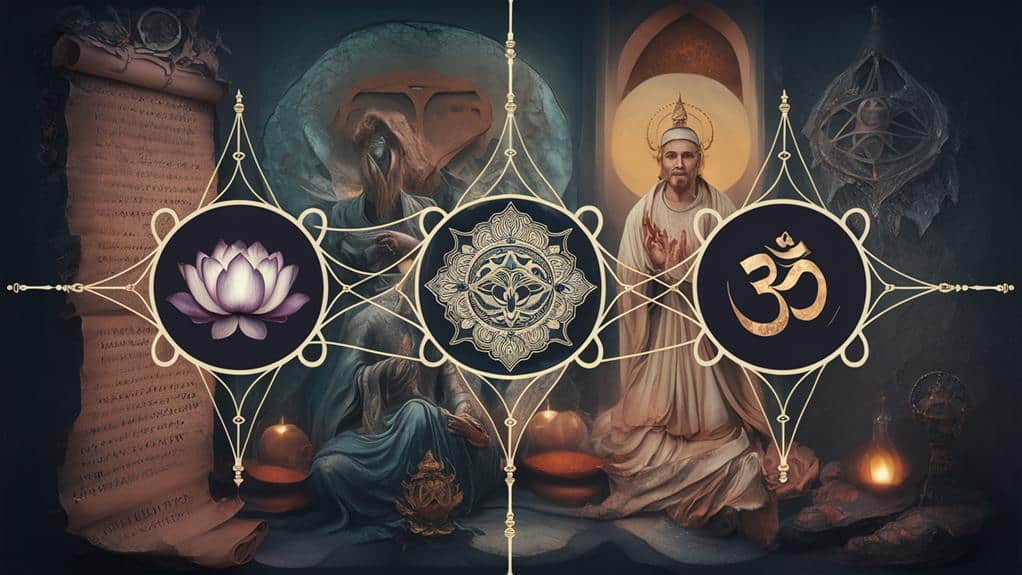
Mystical and spiritual experiences often intersect with religious and philosophical frameworks in complex and varied ways. These intersections are deeply rooted in the quest for ultimate knowledge and connection with the divine or the absolute.
In many major world religions, such as Christianity, Islam, Judaism, Hinduism, and Taoism, mystical traditions coexist alongside doctrinal frameworks. For instance, Christian mystics like Meister Eckhart and Julian of Norwich, and Islamic mystics like Rumi and the Sufi tradition, seek a direct, intimate connection with the divine, often transcending the boundaries of formal religious practices.
Philosophically, mysticism draws from various traditions, including Platonic and Aristotelian thought, which explore the nature of the spiritual and the extrasensory. Mystics may engage in contemplation and meditation to uncover deeper truths, as seen in Buddhist meditations on the eight *jhana*s, which aim to transcend the spiritual domain altogether.
These intersections highlight the fluid boundaries between spirituality, mysticism, and religion. While spirituality can encompass a broad range of religious orientations and personal relationships with the divine, mysticism investigates direct, heartfelt experiences that often dissolve the ego and reveal a profound sense of connection and empathy with all things.
This blend of philosophical inquiry and deep emotional resonance enriches our understanding of human experience and the pursuit of ultimate truth.
Conclusion
As you explore the domains of spirituality and mysticism, you are invited to initiate a journey that transcends the mundane. Spirituality offers a path of continuous growth and connection, while mysticism beckons you to profound, transformative encounters with the divine. In these depths, you may find the boundaries between self and the universe dissolve, revealing an awe-inspiring unity. Embrace these experiences, and you may uncover a profound sense of oneness, a silence that speaks louder than words, and a mystery that enriches your very existence.



